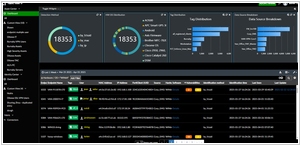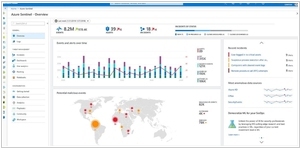FortiAnalyzer vs Microsoft Sentinel
August 05, 2023 | Author: Michael Stromann
6

FortiAnalyzer is a powerful log management, analytics, and reporting platform that provides organizations with a single console to manage, automate, orchestrate, and respond, enabling simplified security operations, proactive identification and remediation of risks, and complete visibility of the entire attack
See also:
Top 10 SIEM software
Top 10 SIEM software
FortiAnalyzer and Microsoft Sentinel are both security information and event management (SIEM) solutions, but they have significant differences in terms of their offerings and target audience. FortiAnalyzer, developed by Fortinet, is primarily focused on collecting, storing, and analyzing log data generated by Fortinet devices like firewalls, switches, and routers. It is specifically designed to cater to Fortinet's ecosystem, providing in-depth visibility and security insights into Fortinet-based networks. FortiAnalyzer's strength lies in its seamless integration with Fortinet products, enabling efficient log analysis and threat detection within the Fortinet environment.
In contrast, Microsoft Sentinel, also known as Azure Sentinel, is a cloud-native SIEM solution provided by Microsoft. It offers a broader scope, capable of ingesting and analyzing log data from a wide range of sources, including cloud applications, on-premises systems, and third-party security tools. Microsoft Sentinel leverages Microsoft's cloud infrastructure and advanced AI capabilities to provide scalable and real-time threat detection and response. With its integration with other Microsoft services, such as Microsoft 365 and Azure, Sentinel can offer comprehensive security insights and automation options, making it an attractive choice for organizations that rely heavily on Microsoft technologies.
Another key difference lies in their deployment models. FortiAnalyzer is primarily an on-premises solution, requiring dedicated hardware or virtual appliances for deployment. On the other hand, Microsoft Sentinel is a cloud-based SIEM, built on the Microsoft Azure cloud platform. This cloud-native approach allows Microsoft Sentinel to benefit from the scalability, elasticity, and global reach of the Azure infrastructure, making it well-suited for modern, distributed environments and organizations with cloud-first strategies. However, the choice between FortiAnalyzer and Microsoft Sentinel ultimately depends on an organization's specific needs, existing infrastructure, and preferences in terms of vendor ecosystems and deployment models.
See also: Top 10 SIEM software
In contrast, Microsoft Sentinel, also known as Azure Sentinel, is a cloud-native SIEM solution provided by Microsoft. It offers a broader scope, capable of ingesting and analyzing log data from a wide range of sources, including cloud applications, on-premises systems, and third-party security tools. Microsoft Sentinel leverages Microsoft's cloud infrastructure and advanced AI capabilities to provide scalable and real-time threat detection and response. With its integration with other Microsoft services, such as Microsoft 365 and Azure, Sentinel can offer comprehensive security insights and automation options, making it an attractive choice for organizations that rely heavily on Microsoft technologies.
Another key difference lies in their deployment models. FortiAnalyzer is primarily an on-premises solution, requiring dedicated hardware or virtual appliances for deployment. On the other hand, Microsoft Sentinel is a cloud-based SIEM, built on the Microsoft Azure cloud platform. This cloud-native approach allows Microsoft Sentinel to benefit from the scalability, elasticity, and global reach of the Azure infrastructure, making it well-suited for modern, distributed environments and organizations with cloud-first strategies. However, the choice between FortiAnalyzer and Microsoft Sentinel ultimately depends on an organization's specific needs, existing infrastructure, and preferences in terms of vendor ecosystems and deployment models.
See also: Top 10 SIEM software




